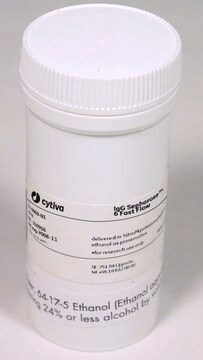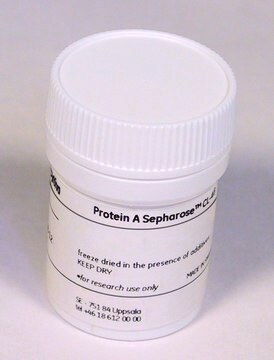A6284
Human IgG−Agarose
suspension
Sinônimo(s):
IgG Agarose
Faça loginpara ver os preços organizacionais e de contrato
About This Item
Produtos recomendados
conjugado
agarose conjugate
Nível de qualidade
Formulário
suspension
Extensão da rotulagem
≥5 mg per mL
Matriz
Cross-linked 4% beaded agarose
ativação da matriz
cyanogen bromide
espaçador de matriz
1 atom
temperatura de armazenamento
2-8°C
Descrição geral
Human IgGs are glycoprotein antibodies that contain two equivalent light chains and a pair of identical heavy chains. IgGs have four distinct isoforms, ranging from IgG1 to IgG4. These antibodies regulate immunological responses to allergy and pathogenic infections. IgGs have also been implicated in complement fixation and autoimmune disorders.
Aplicação
IgG-Agarose is an immuno-adsorbent that can be used to affinity purify antibodies, remove species-specific cross-reacting antibodies or remove contaminating antibodies from an antiserum preparation. Typically, cross-reacting antibodies may be removed from an antiserum preparation using an equal volume of IgG-Agarose (resin volume). However, the resin to antiserum ratio will vary with individual applications.
Tandem affnitiy purification pulldown was performed in yeast cultures using agarose-linked human IgG. Supernatants were mixed with 30μl of agarose beads overnight.
forma física
Suspension in 0.5 M NaCl containing preservative.
Exoneração de responsabilidade
Unless otherwise stated in our catalog or other company documentation accompanying the product(s), our products are intended for research use only and are not to be used for any other purpose, which includes but is not limited to, unauthorized commercial uses, in vitro diagnostic uses, ex vivo or in vivo therapeutic uses or any type of consumption or application to humans or animals.
Código de classe de armazenamento
10 - Combustible liquids
Classe de risco de água (WGK)
WGK 3
Ponto de fulgor (°F)
Not applicable
Ponto de fulgor (°C)
Not applicable
Escolha uma das versões mais recentes:
Já possui este produto?
Encontre a documentação dos produtos que você adquiriu recentemente na biblioteca de documentos.
Graciela C Calabrese et al.
Thrombosis research, 105(6), 537-541 (2002-07-02)
Antithrombin (AT) high affinity of unfractionated heparin (UFH) resides in a specific pentasaccharide sequence. Heparin also regulates complement activity on the classical and the alternative pathways. Most experimental pieces of evidence accumulated show that these important activities reside in different
Pierre Fotso et al.
The Journal of biological chemistry, 280(30), 27613-27623 (2005-06-04)
The conserved oligomeric Golgi (COG) complex is an evolutionarily conserved peripheral membrane oligomeric protein complex that is involved in intra-Golgi protein trafficking. The COG complex is composed of eight subunits that are located in two lobes; Lobe A contains COG1-4
Graciela C Calabrese et al.
Thrombosis research, 113(3-4), 243-250 (2004-05-14)
Dermatan sulfate (DS) is a member of the family of structurally complex, sulfated, linear heteropolysaccharides called glycosaminoglycans (GAGs). It has a similar structure to heparin and heparan sulfate (HS), but with acetylgalactosamine replacing glucosamine, and the uronic acid moiety, mainly
A G Norden et al.
Clinical chemistry, 43(6 Pt 1), 957-962 (1997-06-01)
A novel interference with measurements of serum free thyroxine (FT4) caused by rheumatoid factor (RhF) is described. We found misleading, sometimes gross, increases of FT4 results in 5 clinically euthyroid elderly female patients with high RhF concentrations. All 5 patients
Yeon Jeong Kim et al.
Frontiers in plant science, 10, 667-667 (2019-06-14)
Control of protein turnover is a key post-translational control point in the oscillatory network of the circadian clock. Some elements, such as TOC1 and PRR5 are engaged by a well-described F-box protein, ZEITLUPE, dedicated to their proteolytic turnover to shape
Nossa equipe de cientistas tem experiência em todas as áreas de pesquisa, incluindo Life Sciences, ciência de materiais, síntese química, cromatografia, química analítica e muitas outras.
Entre em contato com a assistência técnica








